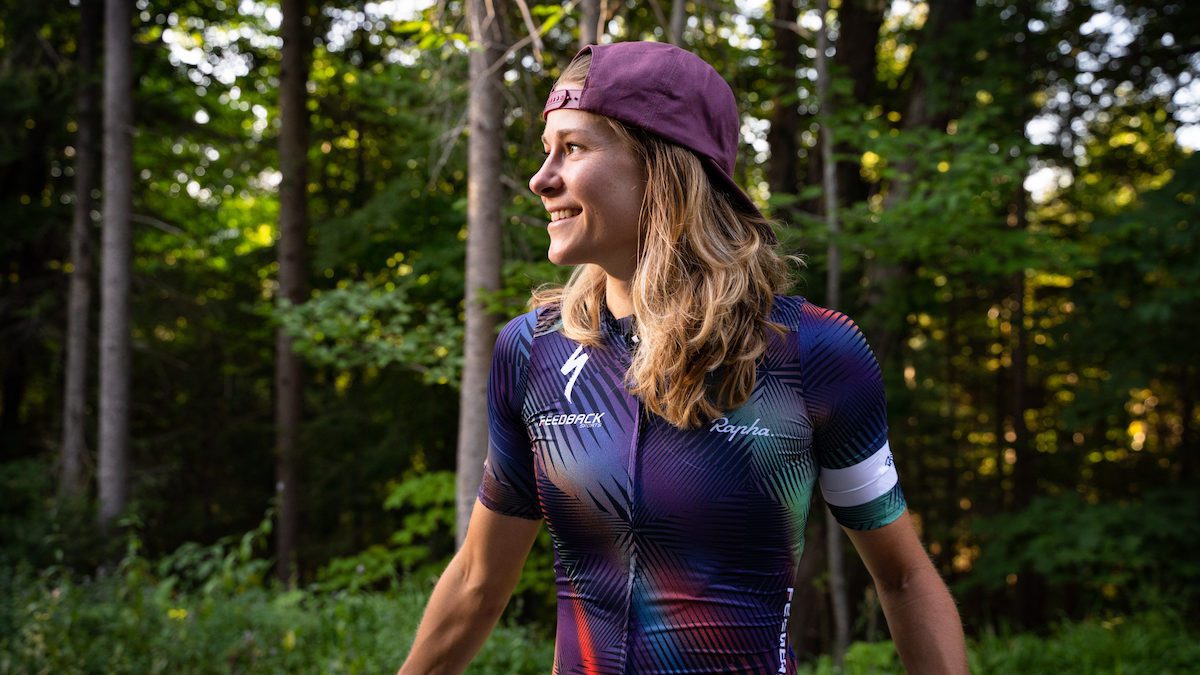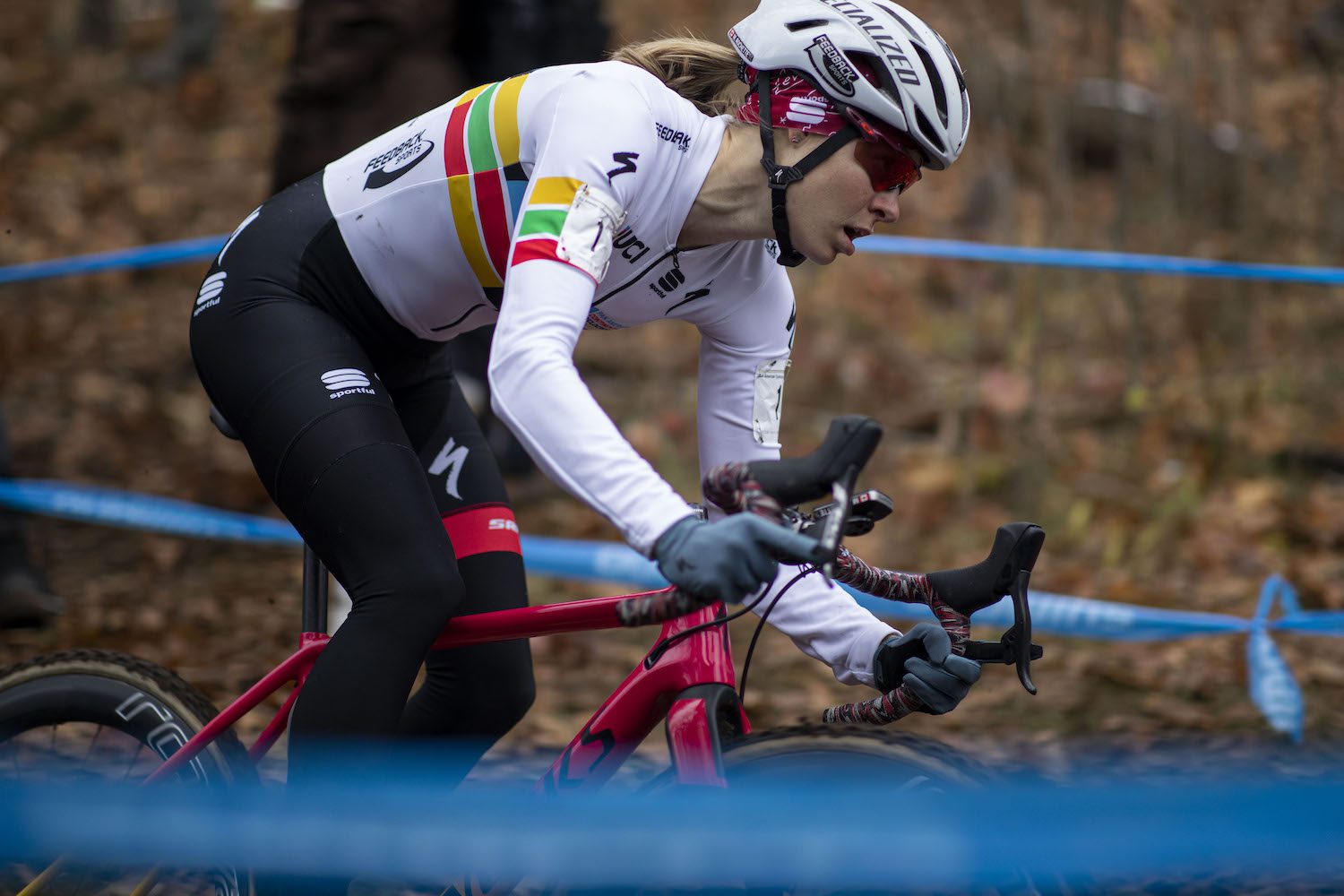Interview: Maghalie Rochette is having the best time back on mountain bikes
Canadian 'cross star is back on (dry) dirt and already showing speed going into the first World Cup of 2022
 Photo by:
David Gagnon
Photo by:
David Gagnon
Maghalie Rochette is back racing World Cup mountain biking for the first time in years and she couldn’t be having more fun. The Canadian cyclocross star, who last raced off-road when she was on Clif Pro Team, is also going really fast. Rochette won her first race back, the Cactus Cup stage race.
From Arizona, Rochette flew to South America for the Brazil World Cup. At a pre-race “mini-World Cup” in Petrópolis, the Canadian was fourth in the XCC, behind Kate Courtney, then 12th in Sunday’s XCO. Not bad at all for her first international mountain bike race in a couple of years.
I caught up with Rochette just as she was headed to Brazil to find out what inspired her return to mountain bike racing. We also talk about what’s changed in mountain biking, and how this new plan fits in with her cyclocross ambitions.
Canadian MTB: What inspired the return to full mountain bike racing? You’ve raced local events in the off-season before, but now you’re headed back to the World Cups.
Maghalie Rochette: When I was on the Clif Pro Team as an u23 I used to race most of the mountain bike World Cups. At the end of the 2018 season, I decided to focus on cyclocross. I’ve always kept riding my mountain bike, just because I think it’s so much fun. I’ve always known I would get back into it, it just had to be the right time, you know? So many times I’d tell myself I was getting back into it, but I wasn’t fully engaged so it didn’t work out.
This time, I had been thinking about it for a little bit and then I watched the Olympics. I thought it’d be fun to try. I’ve always been a fan of the Olympics, as a child I always dreamed of going to the Olympics. Watching this summer I thought, “I’m 28 now, I feel like if I don’t actually try, I will regret it.” So that was inspired me to do it now, but it’s something I’ve been thinking about for a long time. The timing was right and I think I’ve matured over the years, so I felt like I was more ready to give it my best.
So are the Paris 2024 Olympics the goal?
Yes, definitely. It is a far-fetched goal for now. First, the country has to qualify spots and, to do that, only the top three highest-ranked count towards those points. I’m not even in those top three riders right now. For now, it really is just a goal. But I’m motivated to climb the steps one by one and do what it takes to get there. I’m super motivated.
For this year, getting back into World Cup racing, are there any intermediate goals or benchmarks to get to that big goal?
Yes, absolutely. It’s hard to say. I kind of have no clue where I will be. But that’s pretty exciting! I don’t have any expectations in terms of results because I just don’t know. In a way, I’m ready to finish last. But I’m also ready to finish first if that’s in the cards.
I think it’s the privilege of not knowing where I stand. When you’ve been racing against the same people a long time, you kind of know where you are and what to expect. Sometimes that can be limiting, you don’t give yourself the chance to reach higher. Right now, I’m really coming in with an open mind. No expectations, but also no limits.
As for goals, first I want to improve and learn throughout the season. But I also hope to be a player in the races, not just a witness. I don’t want to go there and be lapped. That doesn’t necessarily mean I’ll win, but if I can be there at the front or see what’s happening there for the first few laps, that could be a good first step.
You’re quite clear you’re still going to be racing cyclocross. Talking about not having expectations, do you think that might help when going back to cyclocross.
As much as I believe in what I said, that having no expectations is a good thing, I do think that having had good results in cyclocross last year does give me confidence. So there are both things. Having the experience and the results, that proof that you can actually be at the front of races, gives you a lot of confidence. And I do draw some confidence from those cyclocross World Cups as I’m going into mountain biking as well.
But talking about cyclocross, yes. I do think racing mountain bikes will help for the cyclocross season in many ways. First, I haven’t been mountain biking for a few years. There’s the saying, “If you keep doing the same thing, you can only expect the same results,” so this year we’re really switching things up. So hopefully it brings different results and a few new breakthroughs or learning experiences we can bring into cyclocross. I do think that, yes, they’re different disciplines. But at the end of the day you’re still pedalling and still racing your bike.

What has been the most fun about getting back on the mountain bike?
Honestly, it’s been so fun just training and preparing. It’s just new and exciting. It’s not completely new, but it feels different for me. Even the training’s been exciting, mixing in workouts that I haven’t done for the last few years. Taking the time to dial in the equipment has been exciting.
I think I’m just really excited to see where I’m at. As I said, I have no clue. It could be really good, or it could suck. So I’m excited to compare myself with the other girls. It sounds cliche, but I’ve been really engaged and involved in the process of preparing. I’m really loving trying to improve every day. And then improving every race, trying to learn quickly and apply lessons to get to the top level as quickly as possible.
You’ve ridden mountain bikes before, but are you approaching bike setup differently when you’re preparing for World Cups?
A little bit. The last two years, ever since I’ve been with Specialized, I haven’t raced seriously on mountain bikes. I would do the races close to home, but I wouldn’t really pay attention to suspension or tire pressure that much. I’d just take it from the garage and ride it.
But this year, at that level you have to pay attention to things. We’ve been working with the people at Specialized to set up the suspension correctly, testing different pressures and rebound settings. Now I can understand it, but also feel the difference and know what I want changed for different terrain. There are tires that are new to us and so much. It’s been cool to be more aware of what I’m riding.
When we decided to get back into mountain biking, David – my husband and coach – reached out to some friends like Catharine Pendrel, Geoff Kabush and Katerina Nash, who’ve had success on the mountain bike and have a lot more experience. We wanted to see what had changed in mountain bike technology, what should we pay attention to in training, what obstacles to expect and what traps they thought we might fall into.
So many things came up, but equipment was a bit one. So much has changed since we last raced and now equipment is so important. That motivated us to really dig into the equipment and dial it in.
Has any one thing stood out as the biggest change since you last raced?
Dropper posts is one thing that wasn’t used when I was racing. Suspension is so different. I’m racing the Specialized S-Worx Epic, which uses the Brain suspension. It’s awesome, but you have to figure out how it works and make sure it’s tuned into your preferences to get the most out of it.
The bars are wider, which took a while to get used to. The SRAM shifting and AXS. It sounds simple, but I just have to get in tune with having bigger cassettes and knowing what chainring I want to use. It was so interesting to hear all the feedback from those racers we talked to about that.
Those are things that have come out one at a time, incrementally, for the rest of us. You’re getting them all at once.
It’s fun though! Even tire width. Tires are wider than when I was racing five years ago. That’s interesting too, you can run lower pressure and play with it a lot more. There’s so much cool stuff that has changed.
We’re seeing more top athletes mix disciplines. You’ve now had the experience of mixing disciplines and focusing exclusively on ‘cross. Do you think there’s any advantages to mixing up the calendar?
I think so, but I think you have to be smart with it. That’s just my personal opinion based on my experience. But I think before, when I was racing two full calendars, I was never really taking a break. At some point it caught up to me. I was always a little tired and never performing really well. I was always OK but I was rarely really good.
The last couple of years of racing just cyclocross I got to experience what it’s like to feel really fresh. To actually train and prepare well at home then go to races and perform. Now we’re trying to mix both. Trying to race more but making sure we have periods for resting and just training. It’s not going to be a non-stop calendar.
The end of World Cup cross country season and the start of cyclocross overlap. Do you have a plan for that already or feel it out as you go?
It’ll play out later, but we’ve thought about it. I’m not going to race the full mountain bike circuit. I’m going to do the first three, Brazil, Nove Mesto and Albstadt. Then, in July, I’ll take a break for training. June and July, I’ll be based at home. There are local races and nationals that I’ll be at, but I’ll focus on resting and training. Then we’ll go back for Mont-Sainte-Anne and Snowshoe and hopefully, if we qualify, worlds. That brings us to August and I think, for me, that’s where I’ll stop mountain bikes and start to get into cyclocross.
We’re keeping it open. We might start the season in Europe. We might just decide to come home and start, as we always have, at Rochester and the local race. To be honest, there’s no set plan yet. But we’ll be there at the start of cyclocross for sure. We want to use the fitness from the end of mountain bike season to start the cyclocross season strong.
